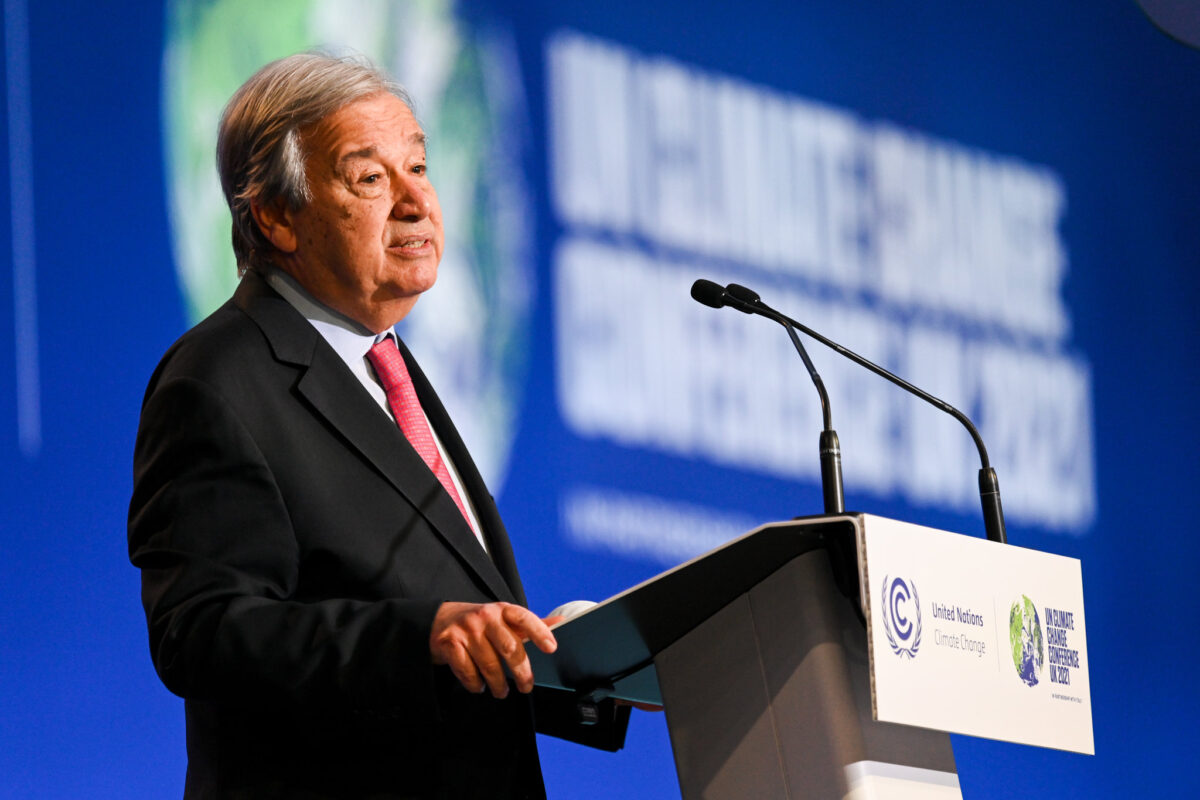António Guterres Sounding the Alarm
UN Climate Action Summit New York
‘You Are Failing Us’. From Abidjan to Zürich, and Zanzibar to Adelaide, and estimated 7.6 million concerned people took to the street to deliver that unambiguous statement to world leaders gathered in New York City for the UN Climate Action Summit. Between September 20 and 27, well over 6,000 ‘strike actions’ unfolded in 185 countries involving 820 organisations.
UN Secretary General António Guterres welcomed the support and called on climate activists to nurture and grow their movement so that it may help ‘jolt the world’ and speed up the transition to a carbon-neutral global society. In an op-ed published on the eve of the summit, Mr Guterres argues that, whilst a great many initiatives are currently underway or unfolding, much more needs to be done in order to stave off a ‘climate catastrophe’.
“Nature,” Mr Guterres said, “is angry. You cannot trick nature for it will strike back. We are seeing nature strike back and this is a very serious problem.” The UN secretary general spoke these words to a US television audience during an interview broadcast by CBS, keeping his language as plain as possible and carefully avoiding the assignment of blame. His comments came after a visit to the Bahamas where Hurricane Dorian unleashed ‘total destruction’.
When it comes to climate change, US toes are easily stepped on. However, Mr Guterres senses a change and welcomed the surprise appearance put in by President Donald Trump at the summit; proof, he suggested, that governments sooner or later follow public opinion. A CBS News poll, released mid-September, showed that 69% of Americans want President Trump’s successor to act on climate change. Slightly over half of respondents say such action is needed now.
Though Mr Guterres had urged heads of state to bring a plan rather than a speech to New York, President Trump came empty-handed. From his seat in the general assembly chamber, the US president seemed to listen attentively to a speech delivered by Indian prime minister Narendra Modi though it appeared Mr Trump was not using any device to hear a translation.
Challenging Job
Once upon a time, the job of United Nation secretary general consisted largely of settling disputes between neighbours, brokering talks between warring parties, and keeping the global conversation civilised. The post-war world was, in hindsight, a fairly straightforward proposition: a balancing act between two opposing views kept in equilibrium – bizarrely but not irrationally – by mutually assured destruction in a global application of game theory whereby no player has anything to gain from changing strategy or pursuing supremacy.
There is little use for that logic in today’s multipolar and multi-issue world. Not only have China and the European Union joined the top table, with others waiting to be seated shortly, the two former superpowers have seen their diplomatic heft significantly curtailed by either territorial dismemberment or remarkable political choices.
Ideology as an expression of national intent or vision has now been downgraded to the esoteric pursuit of dreamers and, perhaps, philosophers. Now often ridiculed for predicting the end of history in his 1989 essay, later expanded into a bestseller, US writer and political economist Francis Fukuyama was right in the sense that the ideological debate as such has come to an end. With the exception one or two countries that still cling to the theory and practice of communist dogma, the world has moved on in newfound unison as far as economic management for the creation of wealth is concerned.
This has, regrettably, not solved the problem of underdevelopment, aka poverty. Since Mr Fukuyama’s ‘End of History’, free markets are said to have created unprecedented wealth at an almost dizzying pace, bridging the gap between global GDP and population growth – making everyone a bit better off, though some slightly more than others. Apart from the last assertion, this explanation of events is largely fictional. According to World Bank data, global GDP growth has dwindled since the mid-1960s from almost seven percent in 1964 to just shy of three percent in 2015. Over the same period, global population growth has almost halved from about two percent annually in 1964 to slightly over one percent in 2015.
Efficiencies & Smarts
In a world of finite resources, a realisation that has only recently begun to dawn upon economists, growth – as a driver of societal and individual prosperity – can no longer be derived from monetising the environment and must, per force as well as logic, come from gains in efficiency through the smart use of technology.
Luckily, perhaps, exuberant global growth rates are, though helpful, not necessarily needed for pulling people out of poverty. From 1981, the percentage of the global population subsisting on two dollars per day has been reduced from close to seventy percent to eleven percent. The World Bank considers anything less than two dollars per day extreme poverty.
At the United Nations, Secretary General Guterres must ensure the implementation of the seventeen sustainable development goals (SDGs) in order to hammer the last nail in poverty’s coffin yet must also face the impending ‘climate catastrophe’.
The rubber hits the proverbial road where the end of history tricks nature: the need for constant growth that the triumphant economic model needs in order to function stands at odds with the need to lessen humanity’s environmental footprint. That is Mr Guterres’ conundrum.

The former prime minister of Portugal does not have all the answers. He places his and the world’s trust in the common sense of common people expecting governments to follow the groundswell. For now, however, that upsurge has been mostly limited to pockets of liberalism in Europe, Canada, and Japan plus pockets of enlightenment elsewhere. Activists such as Swedish teen sensation Greta Thunberg have been busy preaching to the choir.
Though millions have voiced their concern and anger, many more millions seem unwilling to accept a revolution to address climate change – an issue both real and intangible. President Trump, always finely attuned to the mood of the nation, spent only a few minutes at the UN Climate Action Summit before visiting a summit-of-one elsewhere in the building to call for the protection of religious freedom – an issue closer to the heart of the American heartland than climate change or its twin, sustainable development. Ms Thunberg doesn’t deliver votes; conservative churchgoers do.
Great Fracture
There is only so much a UN secretary general can do to avoid the ‘Great Fracture’, the term Mr Guterres employs to underscore the risk of a confrontation, violent or otherwise, between the United States and China which both now led by assertive alpha males: “The two largest economies on earth creating two separate and competing worlds, each with their own dominant currency, trade and financial rules, their own internet and artificial intelligence capacities, and their own zero sum geopolitical and military strategies.”
The Great Fracture greatly distracts from Mr Guterres’ job: promoting sustainable development and peace. In his annual address to the General Assembly, Mr Guterres noted that ‘we are not on track’. He also surmised that inequality is exploding.
Usually a bland and predictable affair, this year’s speech came peppered with strong and undiplomatic language. The United Nations chief warned that a great many people are getting ‘trampled’. He mentioned, amongst others, workers who lose their jobs to machines and demagogues taking away voters’ rights. Mr Guterres is, however, most concerned about ‘small elites’ that capture the wealth being generated the world over. The UN secretary general seems downbeat and sees the world approaching a ‘critical juncture’ at which advances made over decades are being reversed, with new forms of authoritarianism ‘shredding the fabric of our common humanity’.
In a way, it is the UN secretary general’s job to sound the alarm. The world is, of course, never at ease, finished, or without hotspots. Mr Guterres merely points out today’s troubles. These are not necessarily any more worrisome than those faced by the global community in the past, though the contemporary geopolitical matrix is, arguably, much more complex than the relatively straightforward east-west and north-south division of before.
In Portugal, Mr Guterres is known as the ‘talking pickaxe’ for his fearsome oratory powers with which he regularly demolished his opponents in parliament. After almost twenty years as an MP for the Socialist Party, Mr Guterres became prime minister in 1995, promising ‘more humanism’. Thanks to a booming economy, the Guterres administration was able to deliver even as it depended on inherently unstable minority coalitions.
Bibliophile
In Portugal and on the world stage, Mr Guterres manages to lead by getting large parties to agree whilst allowing smaller parties to be heard – building bridges in the process. A bibliophile with an exceptionally wide range of interests, Mr Guterres is also a conversationalist equally able to engage on the politics of classical Greece and the finer points of operas by Guiseppe Verdi. As UN high commissioner for refugees, a position he held between 2005 and 2015, Mr Guterres followed his convictions and managed to broaden the categories of people the UN would seek to protect by including internally displaced persons and migrants made homeless by climate change or natural disasters. The UNHCR now protects ‘people on the move’.
As UN secretary general, Mr Guterres not only carries political responsibilities but financial ones as well. Whilst the United Nations may be facing its deepest deficit in own history, the policies and guidelines brokered by the organisation must also help funnel trillions of investment dollars to crucially important initiatives that mitigate all sorts of risk. War, poverty, trade rivalries, political fractures, and climate change – to name but a few of the more pressing global issues – all represent risk to investors sitting on untold trillions in cash and looking for yield and a safe haven.
Cover photo: United Nations Secretary General António Guterres.
- @ 2021 Photo Greta Thunberg by Stefan Müller
- © 2021 Photo António Guterres by COP26


